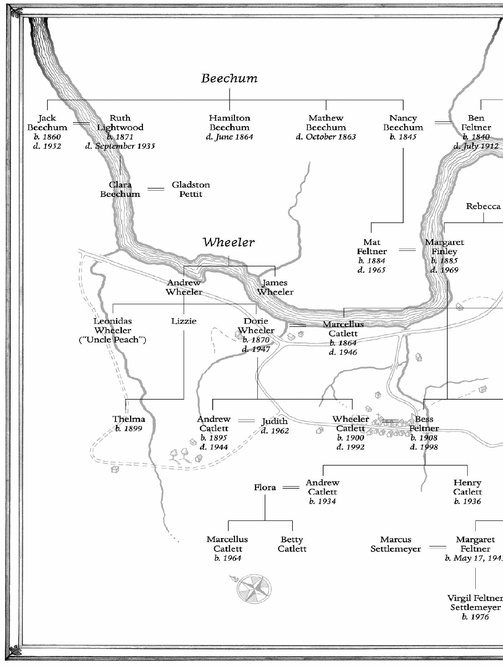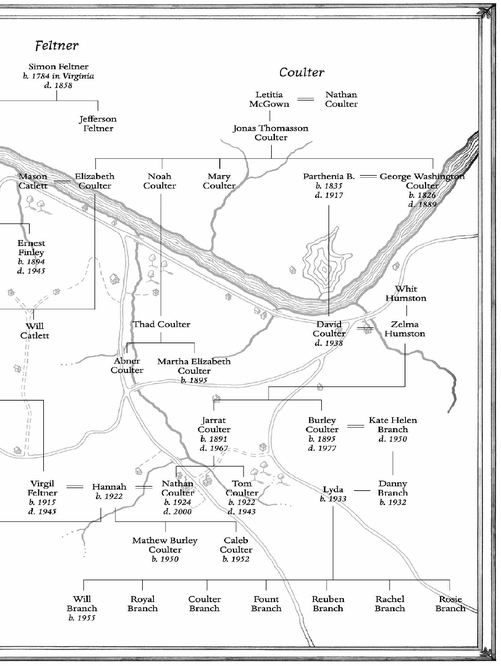Remembering (20 page)
Authors: Wendell Berry

He would stop, he would stop to stand and listen, or to stay forever, for he knows now that he has entered the eternal place in which we live in time, but the dark man, the dark man giving light, does not stop. He steps on up the hill road, and he does not look back.
Though the climb is longer than Andy remembers, even in its strangeness it is familiar. They go up beneath the great-girthed outspreading trees beside the stream of water coming down, the light glancing and
singing off the little falls. As they climb, the music grows steadily stronger and brighter around them. The sun has come over the hill and is shining into the valley now. The shiver that stretched out in Andy's body when the dark man touched him has stayed in it. He is full of joy and he is afraid. He expects to die, and yet he lives, stepping on and on over the dry leaves and the little trembling flowers.
singing off the little falls. As they climb, the music grows steadily stronger and brighter around them. The sun has come over the hill and is shining into the valley now. The shiver that stretched out in Andy's body when the dark man touched him has stayed in it. He is full of joy and he is afraid. He expects to die, and yet he lives, stepping on and on over the dry leaves and the little trembling flowers.
Finally the road brings them up, out from under the trees, onto the high part of the upland. And here the dark man does stop, and Andy stops, nearer to him than he has been before, but still several steps behind.
The dark man points ahead of them; Andy looks and sees the town and the fields around it, Port William and its countryside as he never saw or dreamed them, the signs everywhere upon them of the care of a longer love than any who have lived there have ever imagined. The houses are clean and white, and great trees stand among them and spread over them. The fields lie around the town, divided by rows of such trees as stand in the town and in the woods, each field more beautiful than all the rest. Over town and fields the one great song sings, and is answered everywhere; every leaf and flower and grass blade sings. And in the fields and the town, walking, standing, or sitting under the trees, resting and talking together in the peace of a sabbath profound and bright, are people of such beauty that he weeps to see them. He sees that these are the membership of one another and of the place and of the song or light in which they live and move.
He sees that they are the dead, and they are alive. He sees that he lives in eternity as he lives in time, and nothing is lost. Among the people of that town, he sees men and women he remembers, and men and women remembered in memories he remembers, and they do not look as he ever saw or imagined them. The young are no longer young, nor the old old. They appear as children corrected and clarified; they have the luminous vividness of new grass after fire. And yet they are mature as ripe fruit. And yet they are flowers.
He would go to them, but another movement of his guide's hand shows him that he must not. He must go no closer. He is not to stay. Grieved as he may be to leave them, he must leave. He
wants
to leave. He must go back with his help, such as it is, and offer it.
wants
to leave. He must go back with his help, such as it is, and offer it.
He has come into the presence of these living ones by a change of sight, by which he has parted from them as they were and from himself as he was and is.
Now he prepares to leave them. Their names singing in his mind, he lifts toward them the restored right hand of his joy.




Copyright © 2008 by Wendell Berry.
Â
All rights reserved under International and Pan-American Copyright Conventions.
Â
This book is a work of fiction. Nothing is in it that has not been imagined.
Â
I am grateful to Bucknell University for inviting me to be Poet-in-Residence in the winter of 1987. Much of the work on this book was done during that time.
Â
Library of Congress Cataloging-in-Publication Data
Berry, Wendell, 1934-
Remembering : a novel / Wendell Berry
p. cm.
eISBN : 978-1-582-43957-0
1. Port William (Ky. : Imaginary place) â Fiction.
2. City and town life â Fiction. 3. Kentucky â Fiction. I. Title.
PS3552.E75R46 2008
813'.54 â dc22 2007044431
Â
Â
Counterpoint
2117 Fourth Street
Suite D
Berkeley, CA 94710
Â
Distributed by Publishers Group West
Â
Other books
Adorables criaturas by Dolores Payás
Hitler's Last Witness by Rochus Misch
Zero Separation by Philip Donlay
Lassiter 08 - Lassiter by Levine, Paul
Sacrifice Me: The Complete Season One by Sarra Cannon
Tower of Terror by Don Pendleton, Stivers, Dick
The Gilded Hour by Sara Donati
The Last Empire by Gore Vidal
Poirot and Me by David Suchet, Geoffrey Wansell